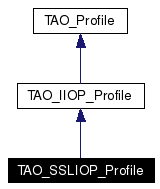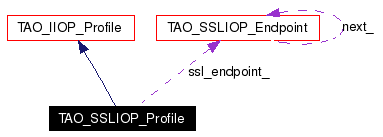
#include <SSLIOP_Profile.h>
Inheritance diagram for TAO_SSLIOP_Profile:


Public Member Functions | |
| TAO_SSLIOP_Profile (const ACE_INET_Addr &addr, const TAO::ObjectKey &object_key, const TAO_GIOP_Message_Version &version, TAO_ORB_Core *orb_core, const::SSLIOP::SSL *ssl_component) | |
| TAO_SSLIOP_Profile (const char *host, CORBA::UShort port, const TAO::ObjectKey &object_key, const ACE_INET_Addr &addr, const TAO_GIOP_Message_Version &version, TAO_ORB_Core *orb_core, const::SSLIOP::SSL *ssl_component) | |
| TAO_SSLIOP_Profile (TAO_ORB_Core *orb_core, const::SSLIOP::SSL *ssl_component) | |
| Create profile with the given SSLIOP tagged component. | |
| TAO_SSLIOP_Profile (TAO_ORB_Core *orb_core, int ssl_only=0) | |
| virtual int | decode (TAO_InputCDR &cdr) |
| virtual int | encode_endpoints (void) |
| virtual TAO_Endpoint * | endpoint (void) |
| virtual void | parse_string (const char *string) |
| void | add_endpoint (TAO_SSLIOP_Endpoint *endp) |
Protected Member Functions | |
| ~TAO_SSLIOP_Profile (void) | |
| Destructor. | |
| virtual CORBA::Boolean | do_is_equivalent (const TAO_Profile *other_profile) |
| Profile equivalence template method. | |
Private Member Functions | |
| int | decode_tagged_endpoints (void) |
Private Attributes | |
| TAO_SSLIOP_Endpoint | ssl_endpoint_ |
| int | ssl_only_ |
|
||||||||||||||||||||||||
|
Profile constructor, same as above except the object_key has already been marshaled. Definition at line 15 of file SSLIOP_Profile.cpp. References TAO_SSLIOP_Endpoint::iiop_endpoint(), and ssl_endpoint_.
00020 : TAO_IIOP_Profile (addr, 00021 object_key, 00022 version, 00023 orb_core), 00024 ssl_endpoint_ (ssl_component, 0), 00025 ssl_only_ (0) 00026 { 00027 this->ssl_endpoint_.iiop_endpoint (&this->endpoint_, true); 00028 } |
|
||||||||||||||||||||||||||||||||
|
Profile constructor, this is the most efficient since it doesn't require any address resolution processing. Definition at line 30 of file SSLIOP_Profile.cpp. References TAO_SSLIOP_Endpoint::iiop_endpoint(), and ssl_endpoint_.
00037 : TAO_IIOP_Profile (host, 00038 port, 00039 object_key, 00040 addr, 00041 version, 00042 orb_core), 00043 ssl_endpoint_ (ssl_component, 0), 00044 ssl_only_ (0) 00045 { 00046 this->ssl_endpoint_.iiop_endpoint (&this->endpoint_, true); 00047 } |
|
||||||||||||
|
Create profile with the given SSLIOP tagged component.
Definition at line 49 of file SSLIOP_Profile.cpp. References TAO_SSLIOP_Endpoint::iiop_endpoint(), and ssl_endpoint_.
00051 : TAO_IIOP_Profile (orb_core), 00052 ssl_endpoint_ (ssl_component, 0), 00053 ssl_only_ (0) 00054 { 00055 this->ssl_endpoint_.iiop_endpoint (&this->endpoint_, true); 00056 } |
|
||||||||||||
|
Profile constructor. ssl_only != 0 will force secure connections, pnly. Definition at line 58 of file SSLIOP_Profile.cpp. References TAO_SSLIOP_Endpoint::iiop_endpoint(), and ssl_endpoint_.
00059 : TAO_IIOP_Profile (orb_core), 00060 ssl_endpoint_ (0, 0), 00061 ssl_only_ (ssl_only) 00062 { 00063 this->ssl_endpoint_.iiop_endpoint (&this->endpoint_, true); 00064 } |
|
|
Destructor. Protected destructor to enforce proper memory management through the reference counting mechanism. Definition at line 66 of file SSLIOP_Profile.cpp. References TAO_Endpoint::next(), TAO_SSLIOP_Endpoint::next(), and ssl_endpoint_.
00067 {
00068 // Clean up the list of endpoints since we own it.
00069 // Skip the head, since it is not dynamically allocated.
00070 TAO_Endpoint *tmp = 0;
00071
00072 for (TAO_Endpoint *next = this->ssl_endpoint_.next ();
00073 next != 0;
00074 next = tmp)
00075 {
00076 tmp = next->next ();
00077 delete next;
00078 }
00079 }
|
|
|
Add endp to this profile's list of endpoints (it is inserted next to the head of the list). This profiles takes ownership of endp. If endp's Definition at line 204 of file SSLIOP_Profile.cpp. References TAO_IIOP_Profile::add_endpoint(), TAO_SSLIOP_Endpoint::iiop_endpoint(), TAO_SSLIOP_Endpoint::next_, and ssl_endpoint_. Referenced by TAO::SSLIOP::Acceptor::create_shared_profile(), decode(), and decode_tagged_endpoints().
00205 {
00206 endp->next_ = this->ssl_endpoint_.next_;
00207 this->ssl_endpoint_.next_ = endp;
00208
00209 // We do not want to add our IIOP endpoint counterpart when we are
00210 // decoding a profile, and IIOP endpoints have been added before we
00211 // even get to SSLIOP-specific decoding.
00212 if (endp->iiop_endpoint () != 0)
00213 this->TAO_IIOP_Profile::add_endpoint (endp->iiop_endpoint ());
00214 }
|
|
|
Reimplemented from TAO_Profile. Definition at line 86 of file SSLIOP_Profile.cpp. References ACE_NEW_RETURN, add_endpoint(), IOP::TaggedComponent::component_data, TAO_Profile::decode(), decode_tagged_endpoints(), TAO::unbounded_value_sequence< T >::get_buffer(), TAO_Tagged_Components::get_component(), TAO_SSLIOP_Endpoint::iiop_endpoint(), TAO::unbounded_value_sequence< T >::length(), TAO_IIOP_Endpoint::next_, TAO_SSLIOP_Endpoint::next_, TAO_Endpoint::priority(), ACE_InputCDR::reset_byte_order(), TAO_SSLIOP_Endpoint::ssl_component_, ssl_endpoint_, IOP::TaggedComponent::tag, and TAO_Profile::tagged_components().
00087 {
00088 int r = this->TAO_IIOP_Profile::decode (cdr);
00089 if (r != 1)
00090 return r;
00091
00092 // Attempt to decode SSLIOP::SSL tagged component. It may not be
00093 // there if we are dealing with pure IIOP profile.
00094 int ssl_component_found = 0;
00095 IOP::TaggedComponent component;
00096 component.tag = ::SSLIOP::TAG_SSL_SEC_TRANS;
00097
00098 if (this->tagged_components ().get_component (component))
00099 {
00100 TAO_InputCDR cdr (reinterpret_cast<const char*> (
00101 component.component_data.get_buffer ()),
00102 component.component_data.length ());
00103 CORBA::Boolean byte_order;
00104 if ((cdr >> ACE_InputCDR::to_boolean (byte_order)) == 0)
00105 return -1;
00106 cdr.reset_byte_order (static_cast<int> (byte_order));
00107
00108 if (cdr >> this->ssl_endpoint_.ssl_component_)
00109 ssl_component_found = 1;
00110 else
00111 return -1;
00112 }
00113
00114 // Since IIOP portion of the profile has already been decoded, we
00115 // know how many endpoints it should contain and can finish
00116 // initialization accordingly.
00117 if (this->count_ < 2)
00118 {
00119 // This profile contains only one endpoint. Finish initializing
00120 // it.
00121 this->ssl_endpoint_.iiop_endpoint (&this->endpoint_, true);
00122 this->ssl_endpoint_.priority (this->endpoint_.priority ());
00123 return 1;
00124 }
00125 else
00126 {
00127 // This profile contains more than one endpoint.
00128 if (ssl_component_found)
00129 {
00130 // It is true ssl profile, i.e., not just IIOP, so must have
00131 // ssl endpoints encoded.
00132
00133 if (this->decode_tagged_endpoints () == -1)
00134 return -1;
00135
00136 return 1;
00137 }
00138 else
00139 {
00140 // IIOP profile - doesn't have ssl endpoints encoded. We
00141 // must create 'dummy' ssl endpoint list anyways, in order to
00142 // make iiop endpoints accessable and usable.
00143 for (size_t i = 0;
00144 i < this->count_;
00145 ++i)
00146 {
00147 TAO_SSLIOP_Endpoint *endpoint = 0;
00148 ACE_NEW_RETURN (endpoint,
00149 TAO_SSLIOP_Endpoint (0, 0),
00150 -1);
00151 this->add_endpoint (endpoint);
00152 }
00153
00154 // Now that we have a complete list of ssl endpoins, we can
00155 // connect them with their iiop counterparts.
00156 TAO_IIOP_Endpoint *iiop_endp = &this->endpoint_;
00157
00158 for (TAO_SSLIOP_Endpoint * ssl_endp = &this->ssl_endpoint_;
00159 ssl_endp != 0;
00160 ssl_endp = ssl_endp->next_)
00161 {
00162 ssl_endp->iiop_endpoint (iiop_endp, true);
00163 ssl_endp->priority (iiop_endp->priority ());
00164 iiop_endp = iiop_endp->next_;
00165 }
00166
00167 return 1;
00168 }
00169 }
00170 }
|
|
|
Helper for
Definition at line 274 of file SSLIOP_Profile.cpp. References ACE_NEW_RETURN, add_endpoint(), IOP::TaggedComponent::component_data, TAO::unbounded_value_sequence< T >::get_buffer(), TAO_Tagged_Components::get_component(), TAO_SSLIOP_Endpoint::iiop_endpoint(), TAO::unbounded_value_sequence< T >::length(), TAO_IIOP_Endpoint::next_, TAO_SSLIOP_Endpoint::next_, TAO_Endpoint::priority(), ACE_InputCDR::reset_byte_order(), TAO_SSLIOP_Endpoint::ssl_component_, ssl_endpoint_, and IOP::TaggedComponent::tag. Referenced by decode().
00275 {
00276 IOP::TaggedComponent tagged_component;
00277 tagged_component.tag = TAO::TAG_SSL_ENDPOINTS;
00278
00279 if (this->tagged_components_.get_component (tagged_component))
00280 {
00281 const CORBA::Octet *buf =
00282 tagged_component.component_data.get_buffer ();
00283
00284 TAO_InputCDR in_cdr (reinterpret_cast<const char* > (buf),
00285 tagged_component.component_data.length ());
00286
00287 // Extract the Byte Order.
00288 CORBA::Boolean byte_order;
00289 if ((in_cdr >> ACE_InputCDR::to_boolean (byte_order)) == 0)
00290 return -1;
00291 in_cdr.reset_byte_order (static_cast<int> (byte_order));
00292
00293 // Extract endpoints sequence.
00294 TAO_SSLEndpointSequence endpoints;
00295 if ((in_cdr >> endpoints) == 0)
00296 return -1;
00297
00298 // Use information extracted from the tagged component to
00299 // populate the profile. Begin from the end of the sequence to
00300 // preserve endpoint order, since <add_endpoint> method reverses
00301 // the order of endpoints in the list.
00302 for (CORBA::ULong i = endpoints.length () - 1;
00303 (i + 1) != 0;
00304 --i)
00305 {
00306 TAO_SSLIOP_Endpoint *endpoint = 0;
00307 ACE_NEW_RETURN (endpoint,
00308 TAO_SSLIOP_Endpoint (0, 0),
00309 -1);
00310 endpoint->ssl_component_ = endpoints[i];
00311 this->add_endpoint (endpoint);
00312 }
00313
00314 // Now that we have a complete list of ssl endpoins, we can
00315 // connect them with their iiop counterparts, which have been
00316 // extracted/chained during the IIOP profile decoding.
00317 TAO_IIOP_Endpoint *iiop_endp = &this->endpoint_;
00318
00319 for (TAO_SSLIOP_Endpoint * ssl_endp = &this->ssl_endpoint_;
00320 ssl_endp != 0;
00321 ssl_endp = ssl_endp->next_)
00322 {
00323 ssl_endp->iiop_endpoint (iiop_endp, true);
00324 ssl_endp->priority (iiop_endp->priority ());
00325 iiop_endp = iiop_endp->next_;
00326 }
00327
00328 return 0;
00329 }
00330
00331 // Since this method is only called if we are expecting
00332 // TAO_TAG_SSL_ENDPOINTS component, failure to find it is an error.
00333 return -1;
00334 }
|
|
|
Profile equivalence template method.
Reimplemented from TAO_IIOP_Profile. Definition at line 173 of file SSLIOP_Profile.cpp. References TAO_SSLIOP_Endpoint::is_equivalent(), TAO_SSLIOP_Endpoint::next_, and ssl_endpoint_.
00174 {
00175 const TAO_SSLIOP_Profile *op =
00176 dynamic_cast<const TAO_SSLIOP_Profile *> (other_profile);
00177
00178 // Make sure we have a TAO_SSLIOP_Profile.
00179 if (op == 0)
00180 return 0;
00181
00182 // Now verify TAO_SSLIOP_Endpoint equivalence.
00183 const TAO_SSLIOP_Endpoint *other_endp = &op->ssl_endpoint_;
00184 for (TAO_SSLIOP_Endpoint *endp = &this->ssl_endpoint_;
00185 endp != 0;
00186 endp = endp->next_)
00187 {
00188 if (endp->is_equivalent (other_endp))
00189 other_endp = other_endp->next_;
00190 else
00191 return 0;
00192 }
00193
00194 return 1;
00195 }
|
|
|
Reimplemented from TAO_IIOP_Profile. Definition at line 217 of file SSLIOP_Profile.cpp. References ACE_OutputCDR::begin(), IOP::TaggedComponent::component_data, ACE_Message_Block::cont(), TAO_IIOP_Profile::encode_endpoints(), TAO::unbounded_value_sequence< T >::get_buffer(), ACE_Message_Block::length(), TAO::unbounded_value_sequence< T >::length(), ACE_OS::memcpy(), TAO_SSLIOP_Endpoint::next_, ACE_Message_Block::rd_ptr(), TAO_Tagged_Components::set_component(), TAO_SSLIOP_Endpoint::ssl_component(), ssl_endpoint_, IOP::TaggedComponent::tag, TAO_ENCAP_BYTE_ORDER, and ACE_OutputCDR::total_length().
00218 {
00219 // If we have more than one endpoint, we encode info about others
00220 // into a tagged component for wire transfer.
00221 if (this->count_ > 1)
00222 {
00223 // Encode all endpoints except the first one, since it is always
00224 // transferred through standard profile component.
00225
00226 // Create a data structure and fill it with endpoint info for wire
00227 // transfer.
00228 TAO_SSLEndpointSequence endpoints;
00229 endpoints.length (this->count_ - 1);
00230
00231 const TAO_SSLIOP_Endpoint *endpoint = this->ssl_endpoint_.next_;
00232 for (size_t i = 0;
00233 i < this->count_ - 1;
00234 ++i)
00235 {
00236 endpoints[i] = endpoint->ssl_component ();
00237 endpoint = endpoint->next_;
00238 }
00239
00240 // Encode the data structure.
00241 TAO_OutputCDR out_cdr;
00242 if ((out_cdr << ACE_OutputCDR::from_boolean (TAO_ENCAP_BYTE_ORDER)
00243 == 0)
00244 || (out_cdr << endpoints) == 0)
00245 return -1;
00246
00247 const CORBA::ULong length = out_cdr.total_length ();
00248
00249 IOP::TaggedComponent tagged_component;
00250 tagged_component.tag = TAO::TAG_SSL_ENDPOINTS;
00251 tagged_component.component_data.length (length);
00252 CORBA::Octet *buf =
00253 tagged_component.component_data.get_buffer ();
00254
00255 for (const ACE_Message_Block *iterator = out_cdr.begin ();
00256 iterator != 0;
00257 iterator = iterator->cont ())
00258 {
00259 CORBA::ULong i_length = iterator->length ();
00260 ACE_OS::memcpy (buf, iterator->rd_ptr (), i_length);
00261
00262 buf += i_length;
00263 }
00264
00265 // Add component with encoded endpoint data to this profile's
00266 // TaggedComponents.
00267 tagged_components_.set_component (tagged_component);
00268 }
00269
00270 return this->TAO_IIOP_Profile::encode_endpoints ();
00271 }
|
|
|
Reimplemented from TAO_IIOP_Profile. Definition at line 198 of file SSLIOP_Profile.cpp. References ssl_endpoint_. Referenced by TAO::SSLIOP::Acceptor::create_new_profile(), and TAO::SSLIOP::Acceptor::create_shared_profile().
00199 {
00200 return &this->ssl_endpoint_;
00201 }
|
|
|
Override parse_string() from the base class to update the SSL endpoint's iiop endpoint once the base class has completed parsing the string.
Reimplemented from TAO_Profile. Definition at line 337 of file SSLIOP_Profile.cpp. References ACE_CHECK, ACE_CLR_BITS, ACE_ENV_ARG_PARAMETER, TAO_SSLIOP_Endpoint::iiop_endpoint(), TAO_Profile::parse_string(), SSLIOP::SSL::port, TAO_IIOP_Endpoint::port_, TAO_SSLIOP_Endpoint::ssl_component_, ssl_endpoint_, and ssl_only_.
00339 {
00340 TAO_IIOP_Profile::parse_string (ior
00341 ACE_ENV_ARG_PARAMETER);
00342 ACE_CHECK;
00343
00344 this->ssl_endpoint_.iiop_endpoint (&this->endpoint_, true);
00345
00346 if( ssl_only_)
00347 {
00348 this->ssl_endpoint_.ssl_component_.port = this->endpoint_.port_;
00349
00350 // Note that the Security::NoProtection bit is cleared since we
00351 // are sure the server supports SSL (we're told so)
00352 ACE_CLR_BITS (this->ssl_endpoint_.ssl_component_.target_supports,
00353 Security::NoProtection);
00354 }
00355 }
|
|
|
Head of this profile's list of endpoints. This endpoint is not dynamically allocated because a profile always contains at least one endpoint.
Definition at line 159 of file SSLIOP_Profile.h. Referenced by add_endpoint(), decode(), decode_tagged_endpoints(), do_is_equivalent(), encode_endpoints(), endpoint(), parse_string(), TAO_SSLIOP_Profile(), and ~TAO_SSLIOP_Profile(). |
|
|
Allways treat this endpoint as secure, even if the constructor did not explicitely specify a tagged component for SSL.
Definition at line 168 of file SSLIOP_Profile.h. Referenced by parse_string(). |
 1.3.6
1.3.6